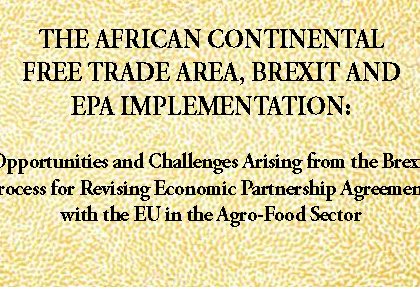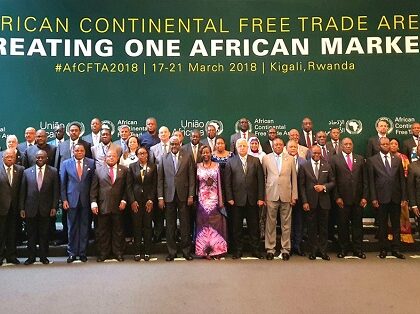AFRICA TRADE NETWORK ACP Civil Society Seminar on Post-Cotonou, Accra, 20-22 March, 2018
introductory: critical features and lessons of EPA experience
- content
- liberalisation
- deregulation
- protectionism
- (re) weaponization of aid
- process
- inherent asymmetry of power; reinforced by
- united-integrated versus fragmentation and incoherence; reinforced by
- deficit of strategic vision
- a (not-so-tiny) fly in the ointment
- (un) civil society
- limited by a detachment from main social forces;
content: liberalisation, deregulation and protectionism
- liberalisation (of trade in goods)
- from non-reciprocal preferences to reciprocal free trade
- deregulation
- sevices; investment; competition; government procurement; capital accounts
- protectionism
- technology – TRIPS, including data exclusivity, agricultural advantage (CAP); SPS
- weaponization’ of aid
- from separate to separate but direct adjunct to negotiation
- adjustment costs; payment of negotiators; studies, etc; [even civil society advocacy]
- all to the distinct disadvantage of ACP. Anti-developmental
short commentary: strategic interest and forum shopping
- Lome IV Mid-Term Review: Consolidation of EU variant of Neo-Liberalism
- The Straight and Crooked Road From Lome to Cotonou
– Intergrating ACP smoothly and gradually into WTO
– The American Challenge: Clinton and AGOA
- Cotonou and the Rise of Free Trade Agreements
– From REPAs to EPAs to (R)EPAs
- Rise of the BRICs and New Additional Competition
- Resulting EPA Agenda: the march of Singapore Issues; Global Europe Strategy; Raw Materials Initiative, etc
process
- inherent asymmetry
- EU-ACP Economic Relationship Inherited from colonialism
- Primary Commodity Export Dependence; reinforced in different forms from Yaounde, to Lome, via Strutural Adjustment to Cotonou
- Strategic unity (Europe) versus strategic fragmentation (ACP)
- ECOWAS; UEMOA – A marriage of total contradiction negotiating a mortgae
- Deficit of strategic Vision on EU
- Lost in post-indepence period; reinforced by SAP;
- Negotiating through dependence
- Mandates
- Negotiating Positions
- Meeting the Costs of Negotiation
the monkey-wrench of (un)-civil society
- First the Good News: Civil Society Significant Disruption
- a counter-narrative to a unilateral narrative of TINA; or development agreement
- technical arguments
- social experiences
- But can be over-rated
- Global Crisis, and awakening of governments
- Delay/disruption; no cessation
- A short –case study of West Africa
- Actually sat in negotiations
- At best confused the process; at worst diluted mass mobilisation
- How So?
- An uneasy juncture of anti-globalisation advocacy with aid groups (POSCAO and ATN)
- Strong on the Inside Weak on the Outside
- Appealed to Poor Victims; Not Proactive Agents in Society
dare we learn?
- Partnership? –Your Partner Depends on Who You Are
- Europe /ACP Are Not Yet Partners
- Recognition of respective inherently conflictual locations in Global order
- Aim for Outcomes Which reduces or eliminates the Basic constraints?
- It is raw materials, markets and industrialisation, stupid
- Who decides what to do with ACP resources and markets?
- Negotiating Strategy and Position Do Not Drop from the Sky
- ACP should build their strategy from conscious understanding of their reality
- Not by copying and pasting Europe
- “Civil Society” Must Dare to Mobilise Outside/Beyond Itself
- A narrative constructed from reality of society as a whole, from perspective of building productive capabilities and economic transformation
- Speak not for the vulnerable, socio-economic constituencies around control of productive resources
- Social mobilisation, not public mobilisation. Presented by Tetteh Hormeku



